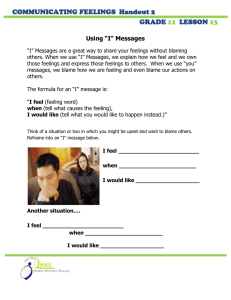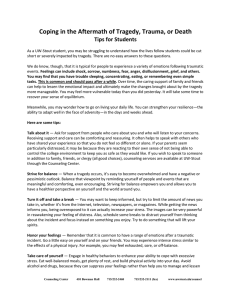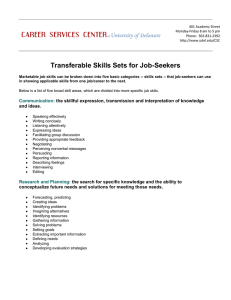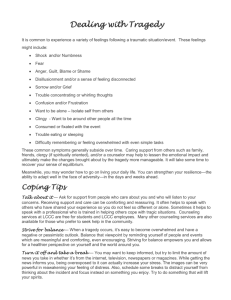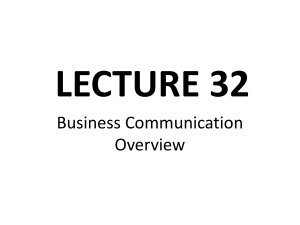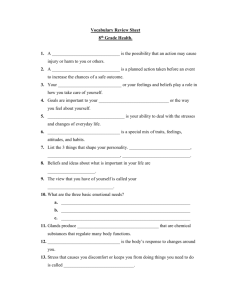How to Assist Students After a Crisis – Faculty/Staff
advertisement
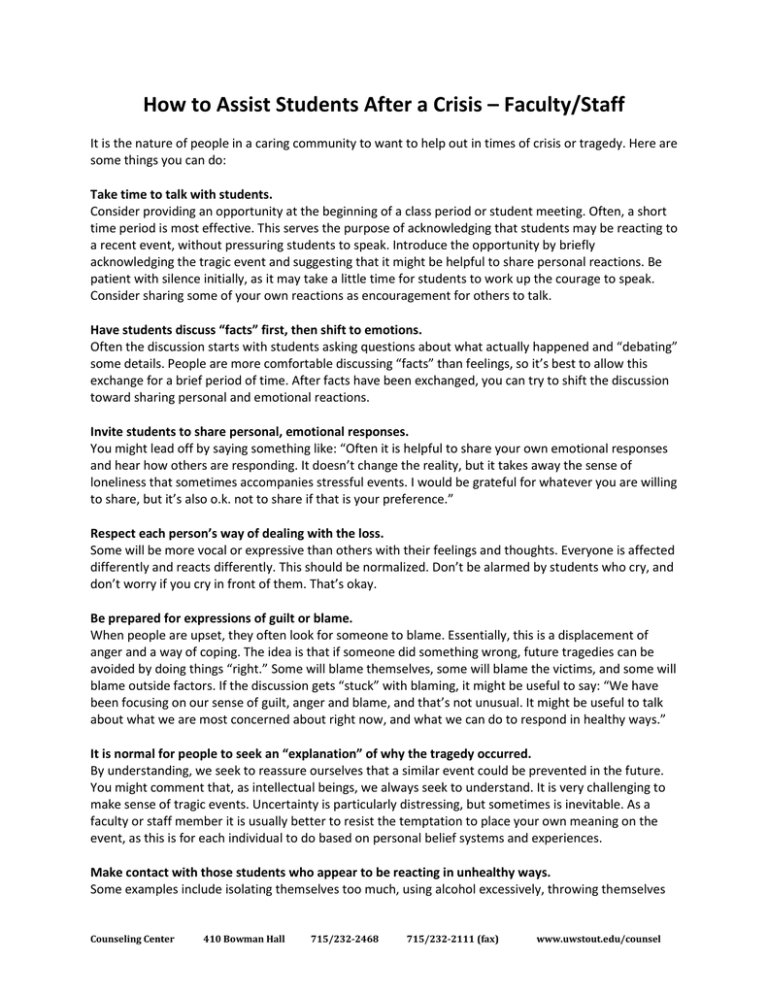
How to Assist Students After a Crisis – Faculty/Staff It is the nature of people in a caring community to want to help out in times of crisis or tragedy. Here are some things you can do: Take time to talk with students. Consider providing an opportunity at the beginning of a class period or student meeting. Often, a short time period is most effective. This serves the purpose of acknowledging that students may be reacting to a recent event, without pressuring students to speak. Introduce the opportunity by briefly acknowledging the tragic event and suggesting that it might be helpful to share personal reactions. Be patient with silence initially, as it may take a little time for students to work up the courage to speak. Consider sharing some of your own reactions as encouragement for others to talk. Have students discuss “facts” first, then shift to emotions. Often the discussion starts with students asking questions about what actually happened and “debating” some details. People are more comfortable discussing “facts” than feelings, so it’s best to allow this exchange for a brief period of time. After facts have been exchanged, you can try to shift the discussion toward sharing personal and emotional reactions. Invite students to share personal, emotional responses. You might lead off by saying something like: “Often it is helpful to share your own emotional responses and hear how others are responding. It doesn’t change the reality, but it takes away the sense of loneliness that sometimes accompanies stressful events. I would be grateful for whatever you are willing to share, but it’s also o.k. not to share if that is your preference.” Respect each person’s way of dealing with the loss. Some will be more vocal or expressive than others with their feelings and thoughts. Everyone is affected differently and reacts differently. This should be normalized. Don’t be alarmed by students who cry, and don’t worry if you cry in front of them. That’s okay. Be prepared for expressions of guilt or blame. When people are upset, they often look for someone to blame. Essentially, this is a displacement of anger and a way of coping. The idea is that if someone did something wrong, future tragedies can be avoided by doing things “right.” Some will blame themselves, some will blame the victims, and some will blame outside factors. If the discussion gets “stuck” with blaming, it might be useful to say: “We have been focusing on our sense of guilt, anger and blame, and that’s not unusual. It might be useful to talk about what we are most concerned about right now, and what we can do to respond in healthy ways.” It is normal for people to seek an “explanation” of why the tragedy occurred. By understanding, we seek to reassure ourselves that a similar event could be prevented in the future. You might comment that, as intellectual beings, we always seek to understand. It is very challenging to make sense of tragic events. Uncertainty is particularly distressing, but sometimes is inevitable. As a faculty or staff member it is usually better to resist the temptation to place your own meaning on the event, as this is for each individual to do based on personal belief systems and experiences. Make contact with those students who appear to be reacting in unhealthy ways. Some examples include isolating themselves too much, using alcohol excessively, throwing themselves Counseling Center 410 Bowman Hall 715/232-2468 715/232-2111 (fax) www.uwstout.edu/counsel into academics or busy-work in ways not characteristic of them, etc. If you see students who appear to be in great distress, it may be helpful to reach out to them privately at an appropriate time (e.g., after class). Find ways of memorializing the loss, if appropriate. After the initial shock has worn off, it may be helpful to find a way of honoring and remembering the person in a way that is tangible and meaningful to each group of students (e.g., a class, residence hall floor, student organization, etc). Make accommodations as needed, for you and for the students. Many who are directly affected by the tragedy may need temporary accommodations in their workload, in their living arrangements, in their own self-expectations. It is normal for people not to be able to function at their full capacity when trying to deal with an emotional situation. This is the time to be flexible, within reasonable limits. Thank students for sharing, and remind them to make use of available resources for coping. In ending the discussion, it is useful to comment that people cope in a variety of ways. Encourage them to take part in memorial events and to seek support from family, friends and faith organizations. You can also alert them resources available on the Counseling Center website. If you think a student would benefit from talking with a professional counselor, you can encourage them contact the Counseling Center for assistance (410 Bowman Hall, 715-232-2468, www.uwstout.edu/counsel). Give yourself time to reflect. Remember that you have thoughts and feelings about what occurred as well, and these thoughts and feelings should be taken seriously. This is important not only for your own well-being, but also for the sake of the students with whom you may be trying to work. Some find it helpful to write down or talk out their feelings and thoughts with colleagues, family and friends. Come back to the feelings as a group at a later time. It is important to acknowledge the adjustments people have made with the passage of time. Just because everything eventually appears to be back to normal does not mean that everyone has finished having feelings about the loss. Checking in after a week, a few weeks, or even later is a helpful way to continue honoring the losses and to acknowledge that the grief process takes time. Adapted from resources prepared by Dr. Joan Whitney, Director, Villanova University Counseling Center, and Dr. Gregory Snodgrass, Director, Texas State University Counseling Center. Used with permission. Counseling Center 410 Bowman Hall 715/232-2468 715/232-2111 (fax) www.uwstout.edu/counsel
